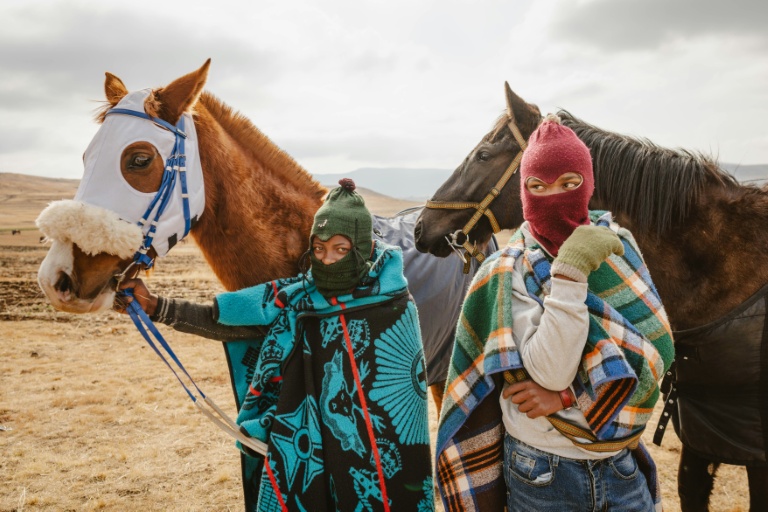Wrapped tightly in a vibrant wool blanket to fend off the biting winter cold, a young jockey — whether boy or adolescent — rode a dusty track carved into the rolling hills of Lesotho’s small kingdom. The horses raced across one of Africa’s highest and finest tracks, situated over 2,200 meters (7,200 feet) above sea level, while spectators lined the course, cheering on the riders.
Horse racing in Lesotho, a country overshadowed by South Africa, is more than just a sport; it is a vibrant cultural festival where betting is an intense and passionate activity. This particular event, held in the village of Semonkon in central Lesotho over the weekend, carried special significance as it was the season’s premier race and also a celebration of King Latiy III’s birthday.
Preparation for the event started early, with horses warming up, wrapped in blankets and balaclavas, parading to the arena with singing and dancing, their saddles weather-beaten but ready for the race. For many jockeys, racing offers a rare escape from the harsh realities of life.
With a population of about 2.3 million, Lesotho is considered one of the poorest countries globally, its significant mineral resources overshadowed by high unemployment and troubling suicide rates among its youth. The economy, heavily dependent on textiles, faces uncertainty after recent trade policy changes announced by the U.S. administration, which even joked that few have heard of Lesotho.
Jockey Tsarn Masosa, 21, who works as a hotel employee and was dressed in layers of white, pink, and blue jackets, said the key to success is to forget all problems and focus entirely on the race. The competition covers 800 to 1,200 meters over rugged mountainous terrain that tests both horses and riders.
Winners can earn up to 1,500 roti (about $85), according to the World Bank. Betting usually involves simple challenges where fans back one horse to surpass another rather than predicting the overall winner. There are no formal tickets or bet slips; bets exchange hands quickly and tensely as horses approach the finish line.
Horses came to Lesotho in the 19th century with European settlers, and over generations, the sturdy Basoto pony was bred. These ponies, along with thoroughbreds from nearby South Africa, now form the racing contenders. Beyond racing, horses remain vital to everyday life, helping people navigate mountainous terrain, herd sheep and goats, and reach remote communities without roads.
This deep connection with horses is part of the culture itself. “Everyone in Semonkon prefers horse racing over soccer,” said Andreas Motrati Mojaje, a 39-year-old maintenance worker. Masosa, still chasing his first win on the dusty oval, has raced seven times and nearly won once, but his passion remains undiminished. “I love fast horses; it brings me joy,” he said with a smile.
Fan Take: This glimpse into Lesotho’s horse racing culture highlights how deeply the sport resonates beyond traditional racing powerhouses, blending tradition, community, and passion. For horse racing fans, it’s a reminder that the sport’s heart beats in unexpected places, offering vibrant stories and untapped potential that can enrich the global racing landscape.



